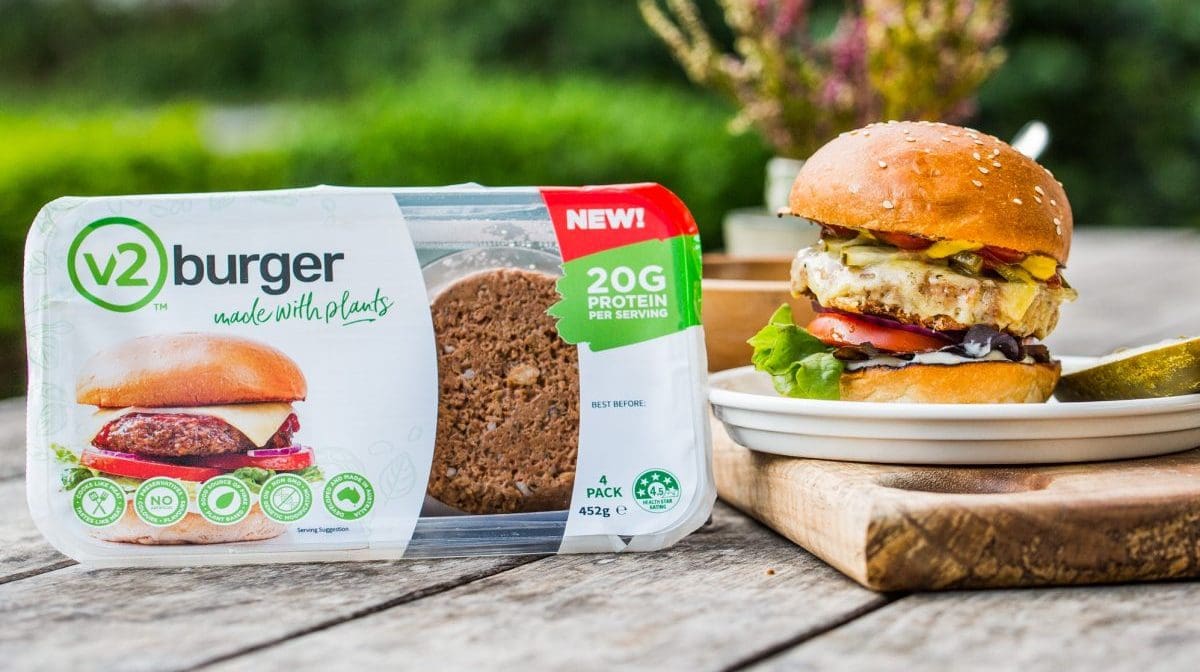
v2food sells a range of meat alternatives at supermarkets across the country. Photo: v2food
AUSTRALIA’S highest-profile plant-based meat company, v2food, has plans to close its manufacturing facility at Wodonga.
The news comes following the departure late last year of v2food founder and CEO Nick Hazell, who is now focused on other start-up opportunities.
Launched in 2019, v2food is a partnership between CSIRO’s investment arm Main Sequence Ventures and Jack Cowin’s Competitive Foods Australia, the parent of Hungry Jack’s.
Apart from making patties for Hungry Jack’s Rebel Whopper, v2food manufacturers plant-based meat products which retail in Australian supermarket chains and other outlets.
Vision delayed, not dead
Partner in Main Sequence Ventures and v2food director, Phil Morle, said it was a difficult decision for the company to make.
“We feel sad about it, because it’s still important to us in the long term, to be committed to…the primary processing,” Mr Morle said.
“Right now, we’re just going to make decisions that keep the company successful in the near term.”
Mr Morle said the Wodonga plant will be closed “incrementally over the next year” as manufacturing of v2food products switches to other sites while v2food works to develop new products.
“We will continue to do what we were doing at Wodonga, but we’ll do it with third-party suppliers.
“We’re still continuing to do the R&D work on different protein sources, different ways of processing those proteins, which I think will open up other opportunities back down to primary production.”
He said despite this setback, v2food had not abandoned its strategy to have a plant which goes from making isolates through to finished product in Australia.
“Obviously many have tried and failed to get that done over the decades.
“We’ve had a crack at it and not really been successful.
“I will say it’s not a dead plan, but it’s pause for now plan.
“We haven’t given up hope yet, it’s just a mammoth undertaking.
“We need to do it in a time when the company can get to the other end.”
Wodonga plant had big expectations
In December 2020, v2food opened the Wodonga facility to make a plant-protein ingredient which could be transformed into a range of products out of imported soy isolates via an extrusion process.
The company spent $20 million at the site, which included fitting out the 55,470m2 building with new equipment.
The plant reportedly employed 25-30 people and had “room to grow”, according to a release from Invest Albury Wodonga in October 2021.
“[T]hey plan to grow their production capacity and global exportation efforts,” the release said.

Phil Morle
Following this strong growth period which saw the company take 40pc of the Australian alternative protein market, v2food is now winding back to consider its best steps forward.
Continued sales growth
Mr Morle said the continued demand for alternative proteins and v2food’s products has been a positive for the company.
“I’d say what we’re seeing in terms of v2food is it has still continued growth and…is absolutely dominating the category.”
In terms of the wider plant-protein industry, Mr Morle said investment has eased, but there was still strong consumer demand for the product.
“We had a high peak, which was bigger than anything I’ve ever seen.
“That’s come back down to earth, no doubt.
“I think the world is looking at alternative protein now to actually come through the other side.
“I think that’s very much in process; that’s a job for us all to do.”
Ingredient processing hinders growth
Mr Morle said the lack of an Australian plant-protein ingredient manufacturing industry has made it difficult to grow v2food sustainably.
Currently only one company, Australian Plant Proteins at Horsham, is a dedicated producer of plant-protein ingredients in Australia.
APP does not make soy isolates, which are the basis for v2food’s products.
He said it was always the company’s goal to manufacture the products entirely in Australia, including processing soy isolates, but it became an impossible target to undertake alone.
He said this “farm to fork” vision would have included using Australian-grown soybeans.
“The overall strategy was where we were hoping to replace [soy isolates] and use Australian soy to make our own isolate and flow it straight into the factories – that was the big vision.”
Mr Morle said the Wodonga site was to be the centre of that vision.
“I think what we’ve found out in Australia since then is we’ve really felt the burden of the fact that Australia does not have a kind of processing infrastructure here.
“We found ourselves carrying quite a lot of burden to get that done.”
He said changes to the market then made it an imperative for v2food to “bring forward its plans for growth and to become the sort of big food company” it set out to be.
He said this resulted in company having to make “some pretty hard decisions about some of the heavier infrastructure”, namely the Wodonga plant.

Nick Hazell
Future opportunities
Mr Morle said v2food was open to collaborating with new and existing Australian companies which are working to increase the local plant-protein ingredient manufacturing industry.
This includes Unigrain, which is constructing a pulse fractionation plant at Smeaton, and a plan to construct three processing sites in South Australia by a partnership involving APP, Thomas Foods International and Australian Milling Group.
All these projects will use pulses grown in close proximity to the plants.
“We think the way it’s going to go over time is we’ll all get better at using different domestic grains.
“We can then sort of grow those grains close to where the food needs to be in that process.
“v2, and many of the companies like us, are doing that kind of research.”
New leadership
In a statement, v2food said chief operating officer Tim York has taken over as CEO.
“After four amazing years as CEO, the company bid farewell to founder, Nick Hazell, as he transitions away from an active role in v2food,” the statement said.
The statement said Mr York will continue to drive the growth and success of the organisation.
“Tim has been with the company for two years and will see the company through its next phase.”
Grain Central: Get our free news straight to your inbox – Click here

HAVE YOUR SAY